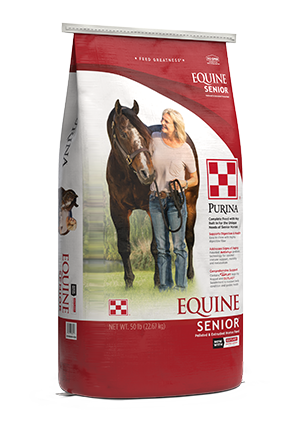Description
Features & Benefits
#1 Veterinarian Recommended Senior Horse Feed
Four out of five equine veterinarians recommend Purina’s Equine Senior® Horse Feed to their clients with senior horses, according to an independent study conducted in 2019
Exclusive ActivAge® Prebiotic Technology
Patented formula includes ActivAge® Prebiotic Technology scientifically studied in senior horses to support optimal function of the aging immune system and optimal mobility in aged horses. The controlled sugar and starch formula, along with ActivAge® Prebiotic Technology, supports an appropriate metabolic response to feeding
Purina® Amplify® High-Fat Nugget
Multiple sources of fatty acids including stabilized rice bran, flaxseed, and vegetable oils help support body condition, shine and bloom
Outlast® Gastric Support
Scientifically shown to support gastric health and comfort and proper pH
Supports Digestion & Health
Easy to chew with highly digestible fiber to meet the needs of horses that cannot chew or digest long-stemmed forage
Easy to Chew
Easy-soak™ Pellet Technology for horses with worn or missing teeth, makes a soft, easy-to-chew mash when soaked in water
100% Vitamins & Minerals
Support overall health of senior horses*
*When fed as directed, with free-choice or added salt, based on Nutrient Requirements of Horses. Sixth Revised Edition – 2007, published by the National Research Council
Highly Fermentable Fiber Sources
Including beet pulp and hay to help maintain body condition and support healthy digestive function
Nutrients
Feeding Directions
Description
Start with the amounts of Equine Senior® horse feed given for the weight and lifestyle of the horse. After observing the horse for a period of time, the amount fed may be gradually increased or decreased to obtain the desired body condition and weight. For feeding directions outside the ranges addressed in these feeding charts, please contact your local Purina retailer or Purina Customer Service at 800-227-8941.
FEEDING WITHOUT FORAGE
| | | WEIGHT OF HORSE IN POUNDS | ||
| Lifestyle | 800 | 1,000 | 1,200 |
| Equine Senior® Horse Feed (lbs/day)* | |||
| Maintenance | 10.75 | 13.50 | 16.25 |
| Light Work | 11.75 | 14.75 | 17.75 |
| Moderate Work | 14.00 | 17.25 | 20.75 |
| Breeding Stallion | 13.00 | 16.25 | 19.50 |
* Feeding recommendations are based on average daily requirements. Actual feeding rates may vary due to individual metabolism and progression rate of the aging processes and may need to be gradually adjusted.
Aging horses unable to maintain adequate body condition when being fed the recommended amount of Equine Senior® horse feed should be examined by a veterinarian for potential health issues.
FEEDING WITH FORAGE
| WEIGHT OF HORSE IN POUNDS | |||
| Lifestyle | 800 | 1,000 | 1,200 |
| (lbs/day) | |||
| Hay or Equivalent Pasture* | 8.00 | 10.00 | 12.00 |
| Equine Senior® Horse Feed (lbs/day)* | |||
| Maintenance | 5.50 | 7.00 | 8.25 |
| Light Work | 6.50 | 8.25 | 10.00 |
| Moderate Work | 8.75 | 10.75 | 13.00 |
Purina® Equine Senior® horse feed is designed to replace all or a portion of the required forage in a horse’s diet. If forage replacement is not needed, consider feeding Equine Senior® Active or Strategy Healthy Edge®.
* Make sure your horse is free of dental problems and can effectively chew and utilize forage. If feeding more hay, reduce the amount of Equine Senior® horse feed by 1.0 lb for every additional 1.5 lbs of hay. If feeding less hay, increase the amount of Equine Senior® horse feed by 1.0 lb for every 1.5 lb decrease in hay fed.
** To meet nutrient requirements, do not feed less than 0.6 lbs per 100 lbs of body weight per day. If your horse gains too much weight at that minimum feeding rate, transition to Purina® Enrich Plus® Ration Balancing Feed.
A 6 lb meal of Equine Senior® Horse Feed supplies a full serving of Outlast® Supplement.
Caution
Wash hands after feeding/handling animals. Not for human consumption. Wash feed/water containers regularly.
Important
and activity level. Feed at regular times, at least twice daily. Do not feed more than 0.8 lbs/100
lbs of body weight per meal when fed without forage or more than 0.5 lbs/100 lbs of body
weight per meal when fed with forage . Do not feed free-choice. Prevent rapid eating
by the horse of any feedstuff.
2. Reduce and/or delay feeding a horse which is hot, excited or showing pain, has fever or
diarrhea. Consult your veterinarian if any problems arise.
3. Any feed changes should be made gradually over a period of 7 to 10 days. Changes in the
rate of feeding should not exceed 1.0 lb per day for each horse.
4. Provide fresh, clean water at all times. Provide your horse with access to salt. Consult with
your veterinarian regularly and maintain a routine dental, parasite control and health care
program for your horse.For horses sensitive to dietary carbohydrates, please consult with a veterinarian or nutritionist for a
recommended diet.

